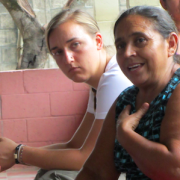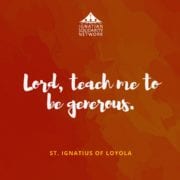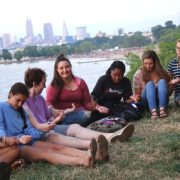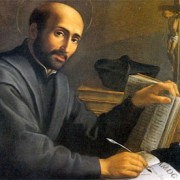Straight to the Source: The Rooms of St. Ignatius of Loyola
BY CHRISTOPHER KERR| November 3, 2019
QUESTION: What is the best to prepare for a 5-day Jesuit Congress celebrating 50 years of the Social Justice and Ecology Apostolate?
ANSWER: Take a trip to the “Rooms of Saint Ignatius of Loyola” at the Gesu in Rome to get steeped in the life of Ignatius and then reflect on the ways his legacy can instruct us during this special gathering.
Upon arriving in Rome early this morning with hopes of getting a bit more centered after the craziness of overnight travel, I decided to head straight to the source of all that is “Jesuit” and “Ignatian” by visiting the “Rooms of St. Ignatius of Loyola.”
What can St. Ignatius offer delegates entering into this experience of the Jubilee Congress for the Social Justice and Ecology Apostolate?
Dedicated to a Life of Service to Christ
St. Ignatius committed his life to Christ, solidifying this commitment when he left his sword at Monseratt.

After deciding to dedicate his life to service of Christ, Ignatius left his sword at the shrine of the Madonna [PHOTO TAKEN: Rooms of St. Ignatius]
- Showing the way to God through the Spiritual Exercises and discernment;
- Walking with the poor, the outcasts of the world, those whose dignity has been violated, in a mission of reconciliation and justice;
- Accompanying young people in the creation of a hope-filled future;
- Collaborating, with Gospel depth, for the protection and renewal of God’s Creation
In introducing these preferences the Jesuits described Jesus as the “door to life” who “wants us to be light and salt for the world,” and “bring fire, passion, love to all people.”
This week will provide an opportunity to reflect with gratitude on the ways that Jesuits and lay collaborators have responded to Jesus’ call and discern new possibilities for the future with the UAP’s in mind.
Can’t Go It Alone: Need a Recipe for Inspiring Collaborators
St. Ignatius cultivated a group of international companions who would become some of the first Jesuits. In “the rooms,” an image of the companions huddled around Pope Paul III as he approves the order gives us a sense of the comradery that they experienced. The experiences of community that each Jubilee delegate has over the course of the week will serve as a good reminder that we cannot enter the work of building a more just world alone. In fact, not only was St. Ignatius effective at inviting initial collaborators, he created something so enticing to men of his time that the Jesuits grew from 10 in 1540 to 1000 by 1556. As we reflect on the future of the social apostolate, what about our vision will invite new people to journey with us?We Have to Have the Long View In Mind
Jesuit leaders who came after St. Ignatius made intentional decisions, beginning with Father General Claudio Aquaviva, to preserve the rooms where Ignatius lived for the last 12 years of his life. The work was complicated but has enabled generations of Jesuits and others to place themselves in Ignatius’ shoes. Aquaviva had the long view in mind.In today’s world of 24-hours news cycles, instant messaging, and Amazon same-day shipping, we can lose sight of the long view. The Jubilee Congress can be a time to reflect on how we are acting for the long view with a more just world as our goal. Are we willing to invest in the hope of transformation, that hearts can be changed through experiences of encounter, prophetic actions, and pastoral approaches? Just like the experience of the early Jesuits, this work will be complicated to be sure.
Make sure to follow highlights from the Jubilee throughout the week on Twitter, Facebook, and Instagram. Find more reflections here.
Chris joined the Ignatian Solidarity Network (ISN) as executive director in 2011. He has over fifteen years of experience in social justice advocacy and leadership in Catholic education and ministry. Prior to ISN he served in multiple roles at John Carroll University, including coordinating international immersion experience and social justice education programming as an inaugural co-director of John Carroll’s Arrupe Scholars Program for Social Action. Prior to his time at John Carroll he served as a teacher and administrator at the elementary and secondary levels in Catholic Diocese of Cleveland. Chris speaks regularly at campuses and parishes about social justice education and advocacy, Jesuit mission, and a broad range of social justice issues. He currently serves on the board of directors for Christians for Peace in El Salvador (CRISPAZ). Chris earned a B.A. and M.A. from John Carroll University in University Heights, Ohio. He and his family reside in Shaker Heights, Ohio.












Leave a Reply
Want to join the discussion?Feel free to contribute!